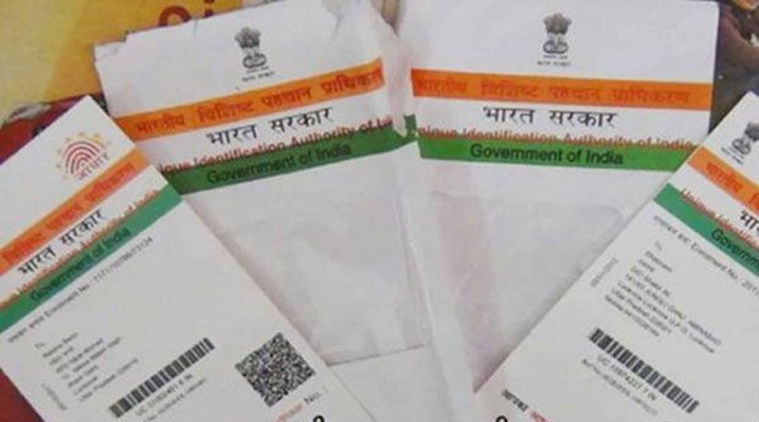 The A-G said Aadhaar was needed for deduplication and for this a pool of identities was necessary. He said terrorists use phones for communication and referred to the government cutting off Internet in Kashmir to prevent the mobilisation of stone-pelters.
The A-G said Aadhaar was needed for deduplication and for this a pool of identities was necessary. He said terrorists use phones for communication and referred to the government cutting off Internet in Kashmir to prevent the mobilisation of stone-pelters.
The Supreme Court on Thursday disagreed with the government’s contention that Aadhaar will help stop bank frauds and said only due diligence by banks while giving loans will curb the menace of Non Performing Assets (NPAs).
“A bank fraud does not take place because of multiple identities. A loan is given by a banker and he knows who the borrower is. A fraud can take place if only the banker is in hand-in-glove with the customer,” said Justice A K Sikri, who is part of a five-judge Constitution bench hearing a batch of petitions challenging Constitutional validity of the Aadhaar Act.
The remarks came as Attorney General K K Venugopal told the bench headed by Chief Justice of India Dipak Misra and also comprising Justices A M Khanwilkar, D Y Chandrachud and Ashok Bhushan that it was useful to establish identity and thereby eliminate fraud in banking and other sectors.
Justice Sikri was quick to point out that bank frauds could not be attributed to lack of Aadhaar. “They float benami companies and have multiple identities”, said the A-G, adding that use of Aadhaar will help eliminate this. Justice Chandrachud said “Same individual can still have multiple transactions…use layers of commercial entities controlled by same individual. Aadhaar can’t stop that”.
Venugopal persisted and added that it will help prevent money laundering for terror. Justice Sikri agreed to his contention and said, “our concern was only on NPAs”, and said that to stop it, “banks will have to do due diligence while advancing loans”.
The A-G replied in a lighter vein; “What the court wants to say is that the Nirav Modis of this country will continue to prosper despite Aadhaar.” Justice Chandrachud said that “just because aadhaar cannot answer all frauds cannot be a ground for it to be unconstitutional.”
Justice Sikri said some petitioners were not against Aadhaar, but only against linking it to every scheme and service. “Their argument is that you (government) have presumed everyone to be a violator,” he said, adding, “that’s were the test of proportionality comes in”
The A-G said Aadhaar was needed for deduplication and for this a pool of identities was necessary. He said terrorists use phones for communication and referred to the government cutting off Internet in Kashmir to prevent the mobilisation of stone-pelters.
Justice Chandrachud said, “We are not questioning the political wisdom to suspend internet…But do terrorists apply for telephone?”. He added: “They communicate through cell phones, satellite phones, but they don’t apply for phones. So it is really necessary to ask all to give Aadhaar for taking phones?”.
The A-G said Aadhaar was being implemented to help the poorer sections and asked if the argument of privacy could be used to defeat its affirmative use. He said, “I say it cannot…wherever Aadhaar is essential for the right to life of the people, I say there is justification for denying privacy provided the invasion is minimal.”
Justice Chandrachud said a subscriber may be ignorant of its technical aspects and wouldn’t know if the personal data can be leaked. “The test is not whether I complain, but whether it is used for any extraneous purposes”, the judge said. The A-G replied that this had been ensured by prescribing offences in the Act for any misuse of the data.